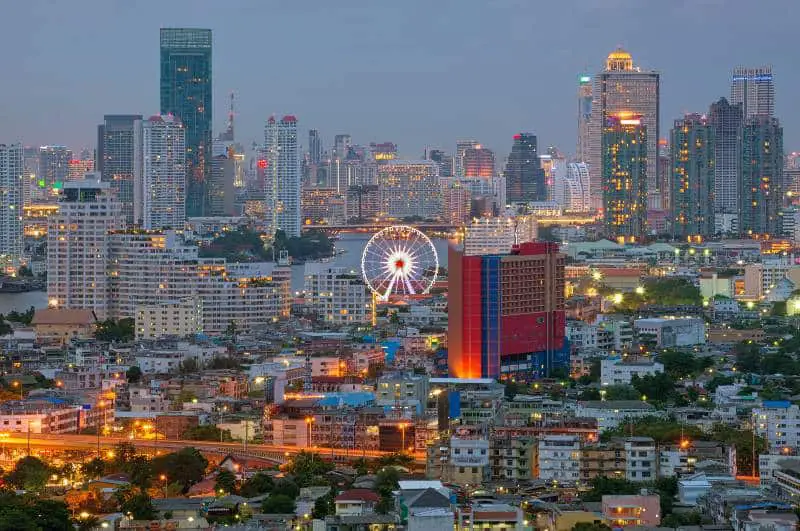The Truth About How Much Money You Need To Retire in Thailand
If you’re looking for an affordable place to retire, Thailand may be just the spot for you. However, How Much Money Do I Need To Retire In Thailand? And what are some of the other costs associated with retiring in this beautiful country? In this post, we’ll take a look at some of the key factors you need to consider when planning your retirement in Thailand. So whether you’re already living in Thailand or just considering making the move, read on for helpful tips and advice.
A budget of $1,500 per month is the bare minimum you should bring with you to Thailand; however, $2,000 would be a more practical amount. You can live relatively well on this sum without having to financial worry too much. It’s possible to get by in Thailand for only $1,000 each month but doing so wouldn’t leave much room for error or enjoyment.
Key Takeaways
- The cost of living in Thailand is significantly lower than that of Western countries.
- Thailand is a great place to retire. It’s warm, it’s beautiful, and there are lots of great things to do.
- You may need to adjust your expectations about what kinds of things you can do in Thailand—you won’t be able to take advantage of all the activities that you might have been able to do in your home country.

How Much Does It Cost to Retire in Thailand?
Thailand is a great place to retire. The weather is warm and tropical, the local food is delicious, as well as international foods, and there’s plenty to do. But what does it cost to live in Thailand?
To be honest, it depends on your lifestyle. If you want to retire in Thailand comfortably with Western standards of living, we recommend budgeting THB50,000–100,000 (1,300 US dollars to 2,000 US dollars) per month. That’s not to say it’s impossible to live comfortably on much less—just that it might be a little more challenging. To put things in perspective, the minimum wage in Thailand is around THB500 (13 US dollars) per day (and that’s not even enough for rent).
If you’re worried about how much it costs to retire in Thailand, don’t be! We’ve got all the information you need right here on our website.
Housing costs
When you’re looking to retire in Thailand, you’ll need to think about your housing costs. And though the overall cost of living in Thailand is relatively low compared to other countries, the cost of housing can vary widely.
A one-bedroom apartment in the center of the Thai capital Bangkok will run you about $562 per month for rent, and that price doesn’t include utilities. If you add those into the equation, the total comes out to more than $640 per month.
Other monthly costs are likely to add up to between $600 and $700 per month—so be sure to factor that into your budget!
Utility costs
If you plan to retire in Thailand, keep your utility costs in mind. They’re not cheap—you can expect to pay between THB3,000 and THB5,000 (80 US dollars to 133 US dollars) per month for a small property with air conditioning. This cost includes Wi-Fi and electricity among other elements.
In many condos, you will be expected to set up your own Wi-Fi—which comes with installation costs. Always check Wi-Fi speed and availability before signing a lease.
The cost of electricity can vary greatly and be anywhere between 1,000-5,000 baht (26 US dollars to 130 US dollars) per month. Your use of air conditioning will have the biggest effect on your bill.
Some condos require you to pay your bills immediately, while others will be added to your monthly rental statement.
It is technically illegal for some older properties to charge more electricity than the official rate, so be sure to check this before signing your contract.
You can normally expect to pay between THB300 and THB600 (8 US dollars to 16 US dollars) per month for water, depending on whether your building has fixed monthly rates or if usage is metered (the latter being cheaper).
Some houses charge a fee for the wastewater collecting system as well. This is normally between THB300 and THB600 per month, depending on whether there are fixed monthly charges or if usage is metered (the latter being cheaper).
Food costs
The cost of food in Thailand largely depends on if you’re open to trying new things. “Thai food” in your home country is usually more expensive than good-quality local cuisine, but imported items almost always come with a heftier price tag here. All told, expect to spend THB6,000 to THB20,000 per month on groceries.
Cost of alcohol
Alcohol and living expenses will depend on your drinking habits, so allocate THB0 to THB20,000 every month. Beer in Thailand runs about ฿60-80/liter while rum and whiskey cost ฿280-450/700mL bottle. However, keep in mind that imported alcohol is expensive because of import tariffs and taxes equaling up to 400%. Consequently, you’ll spend more than you would at home.
Transportation costs
There are several transportation options available to those who live in cities, including motorbike taxis (THB15-100), taxis (THB60-200 per trip), and public transportation (THB15-160 per journey). Car rental is also widely available for anyone brave enough to hit the road, and long-distance taxis are extremely reasonable (from around THB1,500 for a 2.5-hour journey).
Healthcare costs
It is critical to include healthcare costs in your budget. In Thailand, there is no government health insurance or public health insurance for expatriates. You will require private health insurance. The average cost of healthcare remains lower than in the United States, but expenditures can mount if you require regular drugs or medical treatment. Some people believe that having traveler’s health insurance coverage from your own nation is the greatest insurance option. If you plan to travel regularly or return home, this may be a good option for you.
Entertainment costs
The cost of living in Thailand greatly varies depending on your lifestyle. If you enjoy luxury leisure activities such as going to the mall, watching movies, or getting massages, there are plenty of options available throughout the country that will be much cheaper than what you would find in Western countries. For example, a massage can cost anywhere from THB250-300 per hour to THB1,000 or more at a premium hotel. There are also massive and ultra-modern cinema theaters that show all the newest blockbusters; tickets for these range from THB70 to 280.
Other Costs
Thailand offers a thriving international education market with a diverse range of quality and costs. Top-tier education for ex-pat children in Thailand, like in other international capitals, can be prohibitively expensive. If you have children and want to send them to foreign schools, your monthly budget may need to be greatly increased.
Developed outlying cities such as Chiang Mai and Surat Thani are around 20% less expensive than Bangkok, making them well worth considering for individuals looking to retire in Thailand at a lesser cost. Bangkok is easily accessible because of Thailand’s low-cost domestic planes and even lower-cost long-distance trains.
Taxes Implications
After six months in Thailand, you will be required to pay income taxes. This includes both local and foreign income. Even if you do not have a work visa, you must pay taxes.
To file your taxes, you need to consult with a tax accountant. Even if you can file your own taxes, everything is in Thai. Thailand also has treaties with a number of other nations to prevent you from paying taxes on your monthly income twice.
Other Factors to Consider
Visa Requirements
If you’re a national from the United States or Europe, then you won’t need to get a visa before visiting Thailand. All that is required is a valid passport and an onward or return flight ticket. Before you can retire in Thailand, you need to obtain a retirement visa—otherwise known as a Non-Immigrant Long Stay Visa. You can either do this in Thailand or at your home country’s consulate.
The process of obtaining a retirement visa is not terribly complicated, but it can take some time depending on your retirement plans (which we will get into more detail about shortly). You must be at least 50 years old and pass a criminal background check to qualify for such a visa. You must also have a valid passport that is not due to expire for at least one year. Finally, you must meet certain financial conditions.
There are several options for meeting these requirements:
- Have 800,000 baht (or $24,500) in a Thai bank account.
- If you want to retire in Thailand, you’ll need a monthly salary or pension of at least 65,000 baht (which is about $2,000).
- In order to qualify for a retirement visa, your total finances must amount to 800,000 baht ($24,500).
It should be noted that if you choose the first option in the list above, you must keep the money in the Thai account for at least 30 days.
For Budget Conscious
The cost of living in Thailand is much lower than it is in the United States. You can find everything from housing to food at prices that are much lower than they would be in the US.
Housing costs are generally cheaper, but if you’re looking for something upscale and modern, it may cost more than some people would like. However, if you’re willing to settle for a smaller space with fewer amenities, it will be much more affordable.
Living Large
If you’re looking to live large in Thailand, you’ll want to set aside a large sum of money. It’s possible to live a comfortable lifestyle on a budget of around $1,000-$2.000 per month in Thailand, but if you want more luxury and amenities, it will cost more than that.
Specific Healthcare Needs
When you’re an ex-pat in Thailand, you may have some specific healthcare needs that are different than the locals. For example, if you’re over the age of 50 and have a history of heart disease or diabetes, you’ll want to be sure your medications are available in Thailand.
Similarly, if you’re pregnant or breastfeeding, it’s important to find out what kind of prenatal care is available in Thailand—and whether there are any language barriers that might make it difficult for you to communicate with your doctor.
Another consideration is how long it will take to get an appointment with a specialist if necessary; in some countries this can take weeks or even months.
In general, ex-pats should also be aware that some medical treatments may not be covered by their insurance policy and others may require pre-authorization.
Comparing the Cost of Retirement In Thailand
Thailand Vs. The Rest of the World
As a result, the question arises: is Thailand a good investment for retirement?
According to the same survey, a retiree requires $515,742 in the United Kingdom and $601,489 in the United States (over a 14-year period).
Thailand costs just $125,000 less than the United Kingdom, but the United Kingdom is chilly, dismal, and wet for 6 months of the year!
Thailand Vs the Rest of SE Asia
You’re probably thinking that Portugal, Italy, and Mexico would be fantastic choices, but you enjoy Asia, don’t you?
So let’s have a look at how Thailand’s neighbors compare. For retirees, the following nations are all less expensive than Thailand:
- $369,340 in the Philippines
- $290,599 in Indonesia
- $321,614 Malaysia
- $353,906 to Vietnam
- $389,146 Cambodia
- China – $382,596
Singapore, at $946,993, is quite expensive, as is Hong Kong, at $871,578.
Reasons You May Not Want to Retire in Thailand
Thailand is a beautiful country with a rich culture, and it’s often ranked as one of the best places to retire by ex-pat magazines. But before you pack up your bags and head over there, you may want to consider the following reasons why Thailand might not be right for you:
1. Bangkok traffic is notoriously bad. The city center has some of the worst traffic in Asia, and it can take up to two hours to get anywhere during rush hour. If you’re not prepared for this kind of commute, it could make your life incredibly stressful.
2. It’s hot! If you’re used to living somewhere where it gets cold or at least cool during the winter months, then Thailand might not be for you. The temperatures in Bangkok can get up over 90 degrees during the summer months—and that’s just during the day! You’ll need a lot of fans or air conditioning if you want to stay comfortable in your new home during this time of year (or any time).
The heat can be oppressive during the dry season, though. If you’re planning to visit Thailand during this time of year, take precautions against heatstroke by drinking plenty of water and wearing light-colored clothing that covers as much skin as possible.
3. The language barrier can be difficult for some people who aren’t used to speaking Thai fluently or even at all! If you haven’t been able to learn any Thai before moving here then expect some initial frustration until you learn more about how things work here culturally speaking and how to communicate effectively with others. The good news is that most people in Thailand are very friendly and welcoming, so you’ll find it easy to make friends here once you learn some basic Thai greetings!
4. The weather can be a bit unpredictable at times. There are two seasons in Thailand: the rainy season (which typically lasts from May through October) and the dry season (which typically lasts from November through April). During the rainy season, torrential downpours may occur daily for several hours at a time—while during the dry season, temperatures can soar above 100 degrees Fahrenheit (38 degrees Celsius).
If you don’t mind a little rain, however, the rainy season is the ideal time for visiting Thailand because it’s when many Thai people celebrate holidays such as Songkran—a weeklong water festival held in mid-April during which everyone dyes their faces with colored powder and enjoys fun activities like shooting each other with water guns!
How Much Money Do I Need To Retire In Thailand FAQs
What is the Healthcare System Like in Thailand?
Thailand’s healthcare system consists of both private and public facilities. Whether you travel to a private or public hospital, you must show your passport to receive medical attention. Thailand has a large number of private hospitals, notably in the country’s urban areas.
What are the Requirements to Obtain a Retirement Visa?
The essential need for the visa is that you be at least 50 years old. You can check out the full needs for the requirements here.
Where do most ex-pats retire in Thailand?
Thailand’s greatest retirement destinations include Koh Samui, Pattaya, Chiang Mai, Phuket, and Hua Hin. Each of these locations provides a distinct lifestyle destination as well as a pleasant setting.
If you want to find out more about where to live in Thailand, we just have the article for you! Make sure to read it here.
Do retirees pay taxes in Thailand?
During retirement, only income received within Thailand will be taxed. As a result, you will not be required to pay taxes on any income generated abroad. In addition, retirees in Thailand are exempt from paying personal income taxes.
How do I get a long-term visa for Thailand?
We have an article that we wrote here so that you can learn more about this question and what your options are to get a long-term visa for Thailand.
Conclusion
In the end, what it will really come down to is predicting how much you will spend during your retirement. Of course, some estimates are better than others, but determining the actual figures will take a bit of guesswork on your part. You could go for the absolute minimum and feel confident that you’re doing enough, or you could see how close you can get to living like a king without exceeding your ideal budget. Like any other move, it’s ultimately up to you as to how you approach things financially. Nevertheless, this should hopefully provide you with some insight into that all-important question of how much money you’ll need if retiring in Thailand is one of your retirement goals.
If you’re considering making the move to Thailand and are looking for more information about how to make it work financially, make sure to subscribe to our newsletter for the best tips!






